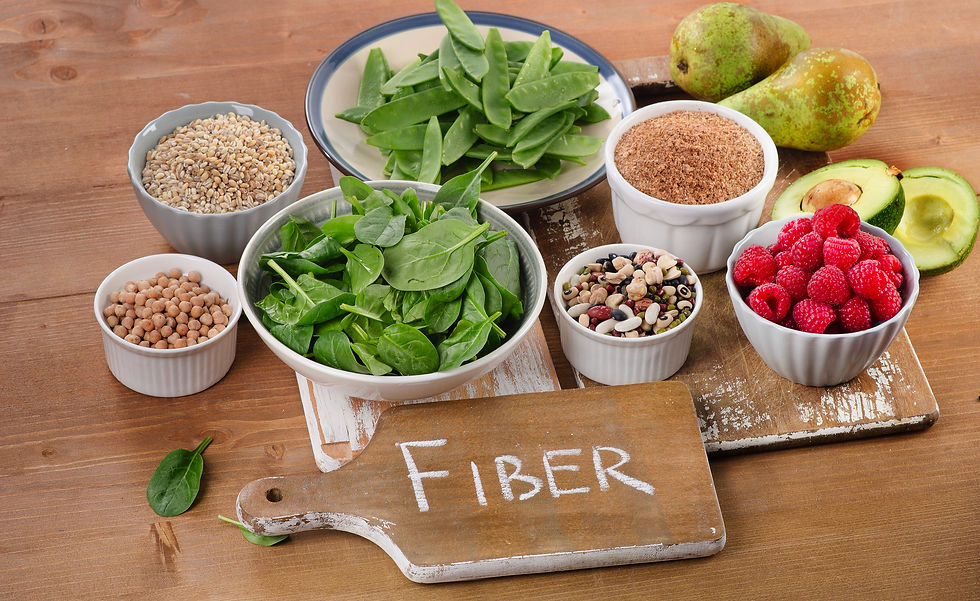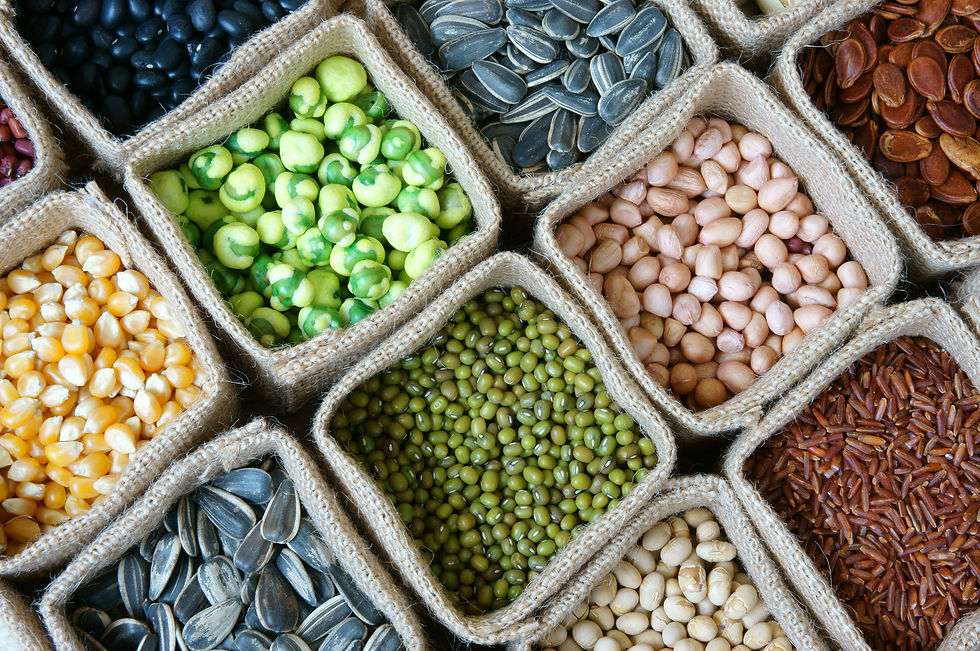Fiber: Eat Your Way Healthy
- Mar 10, 2017
- 7 min read

Fiber plays a starring role in our health, at least it should... or could. If there's one component critically missing in the Western diet, it's fiber and we have the diet related diseases to show for it. The great thing is, you don't have to spend a lot of money to incorporate fiber into your diet. Nature's got you covered. The bonus is, the foods that tend to be high in natural fiber are also high in vitamins, minerals, phytonutrients, and antioxidants.
When people hear that they should eat more fiber, they often head to the health food store to get a fiber supplement. Unfortunately, this doesn't provide the variety of fibers, vitamins, minerals, phytochemicals and other beneficial nutrients that whole foods do.
Most popular recommendations for getting more fiber in your diet are things like high fiber cereal, granola bars, fiber bars, whole grain crackers, canned beans, wheat bran, psyllium husks, supplements and food with additional fiber added to them. None of these foods are good suggestions for adding quality fiber into your diet. They are improperly prepared and very inflammatory. Slow down, take a breath and eat REAL food.

Good Sources of Whole Food Fiber
Whole Grain Berries that have been properly prepared
Beans and other Legumes that have been properly prepared
Nut and Seeds that have been properly prepared
Vegetables
Fruits
Fiber is best known for it's ability to prevent or relieve constipation, but there's much more! Let's take a look at some other benefits fiber can offer:
Weight Management Fiber-rich foods help you fill up on fewer calories so that you can lose weight more easily. I know eating like a rabbit won't keep you satisfied for long. Remember to include fiber from other food sources besides just vegetables and fruits. The fiber in properly prepared whole grain berries, beans and other legumes, nuts and seeds is very satisfying and should be included on a regular basis in your diet to aid in healthy weight management. If you're worried about the carbs, read more here.
Fiber-rich foods are less calorie dense and more nutrient dense. Fiber helps excrete waste and toxins. When you aren't eliminating properly, you're carrying around a load of excess waste material. Fiber also helps keep blood sugar levels steady. Why is this important? Too much glucose leads to high blood sugar which your body can't break down and stores as fat. Too little glucose leads to low blood sugar, sending your body into starvation mode where it burns your lean muscle instead of fat.
Controls Blood Sugar I mentioned blood sugar above. Fiber controls blood sugar by slowing down the breakdown of carbohydrates and the absorption of sugar. In turn, this reduces your risk for gallstones and kidney stones. What's more, a steady blood sugar helps with focus. You probably know what I'm talking about here, when your blood sugar level gets low, it's hard to concentrate. In a similar way, it helps with fatigue.
Lower Risk of Diabetes This is primarily due to better weight management that comes from increased fiber in the diet, as well as better blood sugar control.
Thyroid Health The health of our thyroid is negatively impacted by a low fiber diet. Prevention is better than the cure, but if you're on thyroid medication, you will need to work with your practitioner as you increase fiber, so that your medication can be adjusted as well.

Heart Health
Lowers Bad Cholesterol For one, short chain fatty acids made by the fermenting process in the colon are also rich in tocotrienols which are a natural cholesterol lowering antioxidant. Fiber has a beneficial effect of how fat is digested and eliminated.
Reduces Blood Pressure Researchers in a 2005 study published in the Journal of Hypertension, noted that after 8 weeks of increased fiber in the diet there was a significant reduction in diastolic blood pressure and as well as a reduction in systolic blood pressure.
Energy While fiber does not provide energy directly, it supports the good bacteria in the digestive system. This bacteria uses fiber to produce fatty acids that can then be used as energy.
Reduced Risk of Some Types of Cancer
Breast Cancer Fiber binds excess estrogen in the intestines and excretes it. This is of particular benefit to women, because high amounts of estrogen can be cancer causing. Dietary fat is also associated with increased risk of breast cancer- something that increased whole food fiber can help alleviate.
Colorectal Cancer As most people recognize, fiber is a great promoter of efficient elimination. This waste can contain unhealthy, even toxic substances, including carcinogens. These toxic substances affect our cells: what was once normal can become abnormal and cancerous. For this reason, the less time waste material sits in our digestive system, the better. Moreover, when bacteria break down fiber, they produce a substance called butyrate which may discourage the growth of tumors in the lower digestive track.
Prostate Cancer It's thought that fiber may reduce the risk of prostate cancer, similarly to breast cancer, by affecting hormone levels.

Detoxifying Real Fiber = Real Detox. I am mystified by the popular juice detoxes. Juice, absent of it's natural fiber makes a poor medium for detoxification. Fiber on the other hand, does a little natural scrubbing action on your GI tract. It promotes the elimination of destructive material like BPA, mercury, pesticides, other chemicals, excess estrogen, bile acids and fat by soaking them up and excreting them, before they can be absorbed by the body. Insoluble and soluble fiber move things along efficiently. The longer harmful substances are in contact with the digestive tract, the more damage they can do. The toxins that should be eliminated, instead get re-absorbed leading to inflammation and a whole host of health issues.
Mental Health Interestingly, people with dementia, depression, anxiety, autism, and other mental disorders often have impacted bowels and abnormal elimination. It's a little like the the chicken and egg question. Does the toxicity created by unhealthy elimination affect our mental health, or does our mental health affect our digestive system? There are many theories, but suffice it to say, a healthy elimination system is of utmost importance to our health.
Healthier Skin By now, you should have noticed that fiber is the master detoxifier. Fiber moves yeast, fungus and other substances out of our body. This prevents your skin from excreting them, leading to acne, rashes and other skin disorders.
Stronger Bones Some types of fiber called prebiotics, have been shown to increase the bioavailability of minerals in the food that you consume, which in turn benefits bone density.
Reduces Risk of Digestive Disorders Fiber can reduce the risk of developing digestive disorders such as IBS, Colitis, Crohn's, Diverticulitis etc. This is due in large part to fiber's facilitation of healthy elimination and the benefits that accompany it mentioned above. In addition, short chain fatty acids produced through fermentation of fiber in the digestive tract support the lining of the colon. Fiber serves as a type of food for the good bacteria that makes up the mucosal lining of the GI tract. This mucosal lining protects the gastrointestinal wall, preventing inflammatory diseases, such as irritable bowl syndrome, Crohn's, colitis, leaky gut etc. I'll admit, it does get a bit tricky once someone has IBS, Crohn's or colitis. Since the GI tract has become inflamed, fiber can aggravate symptoms. Because of this, there has been a trend to limit fiber in individuals with digestive disorders in diets such as SCD, Gaps, Low-FODMAP etc. While these types of diets can lead to relief in the short term, they are not a good long term solution, as a low fiber diet leads to many of the other health issues mentioned in this post. Although a person may see temporary relief from said diets, a low fiber diet often leads back to the problem that got them there in the first place. Not to mention the recipe for disaster that a diet low in healthy carbs and high in animal protein stirs up. In the case of digestive disorders, one must be extra careful in relation to fiber, but fiber must not be forgotten. Prevention is much better than a cure. Stay tuned for a post on this topic.

Better Immune System Fiber discourages the growth of bad bacteria and encourages the growth of good bacteria. What does this have to do with our immune system? It's estimated that 75-80% of our immune system is in our gut and healthy bacteria there have everything to do with it. We are just beginning to gain a better understanding of probiotics, prebiotics and a healthy gut flora. What we do know is that fiber benefits our gut flora in a very unique and important way. Fiber provides a type of food for the good bacteria allowing it to thrive and boost your immune system. Good bacteria ferments fiber in the gut. This promotes an environment that's less desirable for bad bacteria. A build up of waste provides the opposite effect, where bad bacteria can flourish. The paleo community might argue that fiber can be obtained through vegetables and while that's true, it's most beneficial to have a variety of fibers, from different food types in one's diet. It's extremely difficult for people who do not consume whole grains and legumes to get enough fiber to keep their gut bacteria healthy. The types of fiber in whole grains and legumes offer unique benefits to our gut flora. A rich and diverse gut flora equals properly functioning bowels and a healthier, happier you.
Normalizes Bowel Movements Most people understand that fiber can prevent constipation, but not many people realize that it also prevents diarrhea, by bulking up the stool. In addition, diarrhea is often the result of chronic constipation. When you have an impacted colon, there's only one way out and that's to blast through. When your GI system is clogged and dysfunctional, you will be too.
It would be very irresponsible of me to promote fiber without mentioning fluid. Fluid is absolutely essential for fiber to function effectively. When you increase your fiber consumption, it's important that you also increase your healthy fluid intake! Together they will move material efficiently through your system. So drink up!
Laxatives and enemas are often used to treat constipation. The downside to laxative and enema use is that they can impair the body's natural ability to eliminate waste and cause damage to the intestine. Natural elimination is always in your best interest.
Reduced Occurrence of Hemorrhoids When you're not constipated, you don't need to strain and are much less likely to develop hemorrhoids.

Again, this is not rocket science. Eat a variety of whole REAL foods. Beneficial sources of fiber are NOT high fiber cereals, whole grain pasta, whole grain bread, whole grain crackers, and fiber supplements. These are processed forms of fiber. While they may increase fiber in your diet, unfortunately they are inflammatory. Stick with real whole foods that have been properly prepared such as whole grain berries like brown rice, millet, oat groats, quinoa, buckwheat, sorghum, amaranth etc. Include a variety of beans and other legumes that have also been properly prepared and eat a variety of fruits, and vegetables. Drink plenty of water and other healthy fluids and you will be on your way to reaping the benefits that fiber can offer.
Fiber plays a staring role in digestive health.
A healthy digestive system really is a pillar of good health.
Eat More Fiber and Have a Healthy and Happy Day!
Comments